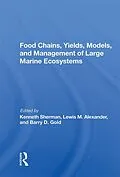Draws on case studies from tropical, temperate, and Arctic waters around the world, comparing multispecies biomass yield models for various large marine ecosystems. Emphasis is given to adaptive management as a strategy for maximizing the sustainability and productivity of living marine resources.
Autorentext
Kenneth Sherman
Inhalt
Preface -- Sustainability of Resources in Large Marine Ecosystems -- A Carbon Budget for the Northeast Continental Shelf Ecosystem: Results of the Shelf Edge Exchange Process Studies -- Warm-Temperate Food Chains of the Southeast Shelf Ecosystem -- Continental Shelf Food Chains of the Northern Gulf of Mexico -- Resource Productivity and Fisheries Management of the Northeast Shelf Ecosystem -- Biomass, Yield Models, and Management Strategies for the Gulf of Mexico Ecosystem1 -- Spatial-Temporal Scales and Secondary Production Estimates in the California Current Ecosystem -- The State of the Main Commercial Species of Fish in the Changeable Barents Sea Ecosystem -- Predictive Yield Models and Food Chain Theory -- Adaptive Strategies for Management of Fisheries Resources in Large Marine Ecosystems -- Empirical and Theoretical Aspects of Fisheries Yield Models for Large Marine Ecosystems -- On the Causes for Variability of Fish Populations: The Linkage Between Large and Small Scales1 -- Global Epidemic of Noxious Phytoplankton Blooms and Food Chain Consequences in Large Ecosystems
